#andrey gromyko
Text
Brown states:
The secret police of both groups of powers, we thought, might be allowed, before the meeting, to install their listening apparatus in the large hotel where it was to take place. They might perhaps also make use of that opportunity to get to know one another a little. An answer from Moscow was received in a surprisingly short time. We were invited to the New York quarters of the Soviet delegation to the United Nations, on Park Avenue, in order to hear it. Our hearts beat high with hope. But when we arrived we found Gromyko in quite a different mood from that of our first meeting. He confined himself to reading out to us – and to the microphones which were probably concealed in the room – an extremely formal rejection of our proposal.
"Brighter than a Thousand Suns: A Personal History of the Atomic Scientists" - Robert Jungk, translated by James Cleugh
#book quotes#brighter than a thousand suns#robert jungk#james cleugh#nonfiction#harrison brown#andrey gromyko#secret police#listening in#moscow#new york#soviet#united nations#park avenue#hope#rejection#microphone
0 notes
Text
My mom whispering to me (an atheist) when we have Christmas dinner with my dad’s side of the family:

7 notes
·
View notes
Text
Safer On Board
From The Pittsburgh Press on this day in 1949:
In Danger Unless We Act, Briton Says –
Pickets Hurl Tomato As Bevin Arrives in U.S. to Sign Pact
Foes of Anti-Semitism Say Name of Foreign Secretary Should Be Spelled ‘S.O.B.’
NEW YORK, March 30 (UP) – British Foreign Secretary Ernest Bevin, arriving today in this country to sign the North Atlantic Pact, was the target of a tomato.
It was hurled…

View On WordPress
0 notes
Text
Russian archival records obtained for this book show that [Joseph] Stalin colluded with his favorited U.S. candidate in 1948, Henry Wallace, [Franklin D.] Roosevelt’s Soviet-friendly wartime Vice President.
The nature of Wallace’s relationship with the Kremlin has long been a subject of speculation. Soviet intelligence is known to have unimaginatively code-named the Vice President CAPTAIN’S DEPUTY during the war. But no evidence has ever emerged that Wallace was recruited as a Soviet agent. He was, however, we can now discern, a Soviet tool. He sincerely believed that “peaceful coexistence” between the Soviet Union and the United States not only could be achieved, but was essential for world peace. All the while, he looked away from (and naively followed Soviet propaganda denying) the existence of Stalin’s mass forced labor and terror programs. According to [President Harry S.] Truman’s counsel Clark Clifford: “It was never clear to me how aware he [Wallace] was of the uses to which the Communist Party was putting him, but whether he knew it or not, he was following the communist line, serving communist ends, and betraying those Americans who supported him as a serious alternative to the two main candidates [in 1948].” Wallace’s naivete about Soviet communism turned him into an asset for Stalin, if not a recruited Soviet agent.
Wallace decided to run in the 1948 U.S. election as the Progressive Party nominee. In April and May that year, he secretly liaised with Stalin about public policies that would be advantageous for the Soviet Union, coordinating his public statements with the dictator. Wallace secretly met with the youthful Soviet ambassador to the UN in New York, Andrei Gromyko, who dispatched the candidate’s messages to the Soviet foreign minister, [Vyacheslav] Molotov, and to Stalin himself. In his memoirs, Gromyko admitted to meeting Wallace, but downplayed the meeting’s significance, suggesting that after talking with him he considered that Wallace had lost contact with the pulse of American life. Archival documents in Moscow reveal that in fact Stalin took Wallace’s position and candidacy seriously, approving his public positions, and answering questions that the former Vice President put to him, which Stalin annotated in his distinctive pencil. Their alignment produced a published open letter from Wallace to Stalin, vetted by the Soviet leader in advance, to which Stalin then publicly replied, all as agreed between the two men.
Wallace’s Presidential election bid in November 1948 dismally failed; he ended up getting barely 2 percent of the vote, while Truman, to his and the nation’s surprise, won a second term. He defeated New York Governor Thomas E. Dewey in one of the greatest upsets in U.S. Presidential history. Ironically, the staff of Wallace’s failed 1948 campaign included none other than the Soviet atom spy Ted Hall. Following his unsuccessful White House run, Wallace had a crisis of faith in his pro-Stalinism. This may have been caused by his realization that Stalin had used and discarded him after the election. Stalin had gotten what he wanted from Wallace. In 1952, Wallace published an article, “Where I Was Wrong,” describing “Russian Communism” as “utterly evil.” The Kremlin and its intelligence services nevertheless learned an important strategic lesson for later in the Cold War: that it could use the freedoms inherent within American electoral campaigns to influence candidates favorable to the Soviet Union.
-- From Spies: The Epic Intelligence War Between East and West by Calder Walton, Simon & Schuster, 2023 (BOOK | KINDLE | AUDIO)
#History#Henry A. Wallace#Vice President Wallace#Soviet Union#Cold War#Cold War History#Joseph Stalin#Stalin#Stalinism#Communism#Soviet History#Espionage#1948 Election#Harry S. Truman#President Truman#Thomas E. Dewey#FDR#Franklin D. Roosevelt#President Roosevelt#Roosevelt Administration#Politics#Political History#Russia#Russian History#Soviet Communism#Spies: The Epic Intelligence War Between East and West#Spies#Calder Walton#Simon and Schuster#Simon & Schuster
26 notes
·
View notes
Text
~translated from Greek:
David who became Goliath on May 13, 2023
On the occasion of the 75th anniversary of the establishment of the State of Israel By Petros Papakonstantinou
Today marks 75 years since David Ben-Gurion proclaimed the establishment of the State of Israel on the lands of historic Palestine.
At the time, his generals estimated that the chances of the Jewish state escaping infant mortality in the inevitable war
with the allied Arab states were 50-50%.
Eventually, Israel prevailed in this conflict, naturalized by the Arabs as the "Nakba" (Catastrophe), and even more so in the next, the "Six-Day War" of 1967, which made it absolute sovereign from the Sinai Peninsula to the Jordan.
The countdown had begun on November 29, 1947, when the General Assembly of the newly established UN decided to divide Palestine,
which until then had British protectorate status (55% Jewish state, 43% Palestinian state, Jerusalem international city).
In the aftermath of the Holocaust, Jews' claim to a national home was politically and morally powerful, even if Arabs were being asked to pay for the crimes of Europeans.
Any thought of creating a Jewish state in Europe, where the largest Jewish populations lived, seemed completely utopian.
The Americans under Truman supported the sharing, calculating that they would ostracize their British allies and competitors
from an oil-rich geostrategic region of the world.
Some enormously Jewish intellectuals, such as Albert Einstein and Hannah Arendt, had their objections, preferring a transnational (Jewish-Arab) state in historic Palestine, but their idealistic internationalism had no luck against the inexorable forces of real history.
Decisive to the establishment of the Israeli state was the support of the USSR under Joseph Stalin.
At the crucial UN General Assembly, then-ambassador and later Soviet Foreign Minister Andrei Gromyko said Moscow preferred a bi-national state, but if this was not accepted by both sides (as it knew would happen), it would support sharing.
Stalin recognized Israel on May 17, 1948, just three days after his proclamation.
In the ensuing war with the Arabs, much of the Jewish weapons came from Czechoslovakia.
By the end of 1953 the Soviet embassy was in Jerusalem, which went beyond even UN resolutions.
The motives of Soviet leaders are easy to understand if one is placed in the context of that historical conjuncture.
The Jewish-socialist Bund Party was active in Tsarist Russia even before the SDRP of Plekhanov, Lenin, and Martov was founded,
and many influential members of the Bolsheviks and Mensheviks (as well as the German and Austrian Social Democrats) were of Jewish origin.
Socialist or socialist tendencies were strong in the young Zionist movement, exemplified by the famous kibbutz, peasant communities of collective ownership.
The religious-minded European right had spearheaded the pogroms against the Jews, while it was the Red Army that had liberated Auschwitz.
Given this, Moscow expected the young state of Israel to be rather friendly to it, more than the reactionary Arab monarchies
tilted towards America, as suggested by the historic Roosevelt-Ibn Saud "deal" on the deck of the cruiser Quincy, Suez.
These calculations soon proved short-sighted. The Arab world was shaken by the wave of anti-colonial, anti-imperialist movements,
typically represented by the Free Officers Movement in Egypt and the Baathists in Syria and Iraq.
On the contrary, Israel has become a lobster state, an outpost of the West and, above all, of the Americans in the heart of the Arab world
and the world's number one oil-producing region.
The myths of David fighting the Goliaths and the "only democracy in the Middle East" collide head-on with reality.
The supposed David receives $4 billion in free military aid each year from the U.S. and is confident, in every conflict,
that the U.S. Cavalry will come to his rescue if they find it dark, as they did in the 1973 Yom Kippur War.
A country without declared borders, without a constitution, with a democracy for Jews, but not for vassals of Arab-Israelis and Palestinians – as much democracy as South Africa's apartheid regime was for whites and only for whites.
Meanwhile, even the leaders of the modern far right, like Le Pen or Meloni, have only good words for Israel, since the place of antisemitism has long been taken by Islamophobia, an ideological corollary of imperialist interventions abroad and the oppression of migrant workers at home.
We have been talking for years about the "trinity of the impossible": that the state of Israel can be Jewish, it can be democratic and it can occupy the Palestinian territories (West Bank, East Jerusalem, Gaza), but it cannot do all three together.
Today we are living in the hour of tragic confirmation.
With the most reactionary government in its history, where religious extremists, openly preachers of ethnic cleansing against Palestinians
hold key ministries, Israel is rocked by huge rallies against the country's transformation into an authoritarian theocracy.
At the same time, a new generation of Palestinians, living in poverty and oppression, frustrated by ageing, incompetent and discredited
leaderships, is taking resistance to the occupation into their own hands in new forms and organizations, like the "Lion's Nest" in the West Bank, with the aroma of a third intifada.
Having ostracized the two-state solution beyond the horizon line, their Israeli and American patrons are pushing the Palestinian people to go the long step and reorient themselves towards an anti-apartheid struggle for equal rights throughout historic Palestine.
The sequel is awaited with interest.
~Petros Papakonstantinou
PRIN newspaper, 13 May 2023~
#Translated from Greek#Petros Papakonstantinou#The 75th anniversary of the establishment of the State of Israel
7 notes
·
View notes
Text

Mikhail Konstantinovich (1833-1902) "Rest in the Park." 1880s - 1890s.
Oil on canvas
In the lower right corner of the author's signature: "M.K.Klodt."
Origin: from the collection of A.A. Gromyko.
Andrey Andreyevich Gromyko (1909-1989) - Soviet diplomat and statesman, in 1957-1985 - Minister of Foreign Affairs of the USSR, in 1985-1988 - Chairman of the Presidium of the Supreme Soviet of the USSR. Doctor of Economic Sciences (1956).
"Tipped" soil, brown and green wipes, a set of pigments and general color, the manner of depicting branches and leaves of trees, the nature of finishing zigzag strokes and, in general, the texture of painting are very characteristic of the artist's picturesque manner.
The plot itself with the genre motif of female figures sitting at the table is unusual for Klodt, who liked to repeat and vary several variants of the same plot. These are the shores of the Gulf of Finland, landscapes with cows, birch alleys and groves, however, the artist's interest in this kind of landscape and genre composition cannot be excluded.
Painter, graphic artist. Born in a family of hereditary artists, the son of an artillery colonel, the famous xylographer K.K. Clodt, nephew of the sculptor P.K. Klodt, cousin of the artist M.P. Clodt. In 1851 he entered the IAH, studied in the class of landscape painting with M.N. and S.M. Sparrows. He was graduated from the Academy with the title of class artist of the 1st degree and the right of a retired trip abroad for a period of three years. In 1862 for the paintings "Valley of the Aa River in Livonia" and "Night in Normandy. Fishermen by the fire" was awarded the title of academician. In 1864, he was awarded the title of professor for the painting "View in the Orel Governorate" presented at the academic exhibition. In 1870 he became one of the founders of TPHV, in 1880 he left the Partnership, but continued to exhibit his works at its exhibitions. In 1871-1872, together with A.P. Bogolyubov contributed to the establishment and opening of a landscape class in IAH. Since 1871 he worked as a full-time professor-teacher of the class, from 1872 - a full-time professor-teacher of the 2nd degree, from 1873 he led the landscape class. Works by M.K. Klodt are in many museum collections, including the State Tretement Hall, the State Russian Museum, the National Art Museum of the Republic of Belarus in Minsk.
Litfund
3 notes
·
View notes
Text
"Absent Gorbachev’s drastic reform agenda, the Soviet system most likely could have staggered along indefinitely. Instead, he unleashed massive pressures from below that brought it down.
Even with the economy and finances in steep decline, the Soviet Union still could hide its weak condition behind a respectable Potemkin facade and negotiate with the United States from a position of relative parity. After 1988, this situation drastically changed: Gorbachev’s decision to launch radical political and state reforms, coupled with the removal of the party apparatus from economic life, created a most severe crisis of the state and produced centrifugal political forces that spun out of control within Soviet society. All this was tantamount to revolution, was visible to the world, and engulfed the Soviet leadership. These policies essentially destroyed the Soviet capacity to act like a superpower on the international arena. The Soviet Union was left in no position to bail out its allies or to present itself as an equal partner to the United States in negotiations.[253]
There are few other examples in history of a leader in charge of a huge ailing state who willingly risked the geopolitical position of a great power and the very foundations of his political power for the sake of a moral global project.[254]
By the spring of 1989, it became obvious even to Gorbachev’s closest assistants that the radical reappraisal of Soviet ideology and history, initiated from above, had triggered a political deluge from below.[255]
And Gorbachev himself was constitutionally incapable or unwilling to resort to force to preserve the system when it became clear it would otherwise collapse.
An additional feature of Gorbachev’s personality that perplexed contemporaries and witnesses was his deep aversion to the use of force. To be sure, skepticism about military force was widely shared among ‘‘new thinkers.’’ It can also be regarded as a generational phenomenon that originated from the impact of World War II and was reinforced by the pacifist trends during the 1960s. Former Soviet foreign minister Andrei Gromyko, for example, privately called Gorbachev and his advisers ‘‘the Martians,’’ for their ignorance of the laws of power politics. ‘‘I wonder how puzzled must be the US and other NATO countries,’’ he confessed to his son. ‘‘It is a mystery for them why Gorbachev and his friends in the Politburo cannot comprehend how to use force and pressure for defending their state interests.’’ Gorbachev personified the reluctance to use force. Indeed, for him it was less a lesson from experience than a fundamental part of his character. The principle of nonviolence was a sincere belief for Gorbachev — not merely the foundation of his domestic and foreign policies but one of his personal codes. His colleagues and assistants confirm that ‘‘the avoidance of bloodshed was a constant concern of Gorbachev’’ and that ‘‘for Gorbachev an unwillingness to shed blood was not only a criterion but the condition of his involvement in politics.’’ Gorbachev, they observe, ‘‘by character was a man incapable not only of using dictatorial measures, but even of resorting to hard-line administrative means.’’ The critics claim that Gorbachev ‘‘had no guts for blood,’’ even when it was dictated by state interests.[256]
As a result, Gorbachev simply let the communist regimes in Eastern Europe slip away, with no intention of intervening.[257] Without Gorbachev and his personal idiosyncrasies, “the rapid disintegration of the Soviet Union itself would not have occurred. At each stage of the Soviet endgame, Gorbachev made choices that destabilized the USSR and sapped its strength to act coherently as a superpower.”[258]
-Kevin Carson, "The Undeclared Condominium: The USSR As Partner in a Conservative World Order" (2023)
...
unmachiavelly based
5 notes
·
View notes
Text

#Nixon50 #OTD 9/28/1973 President Nixon met to review United States-Soviet relations with Andrei A. Gromyko, Minister of Foreign Affairs of the U.S.S.R., Anatoly F. Dobrynin, Ambassador from the U.S.S.R. to the United States, Secretary of State Henry Kissinger, and others. (Image: WHPO-E1548-09)
4 notes
·
View notes
Text


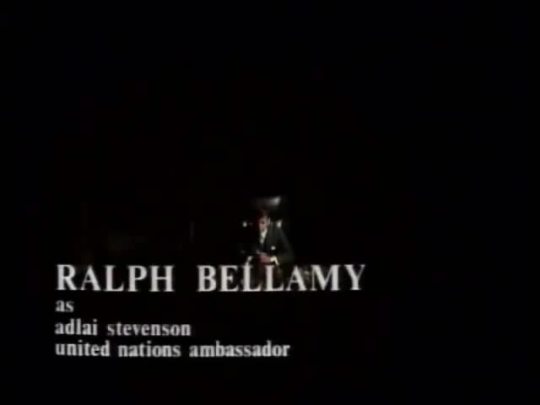



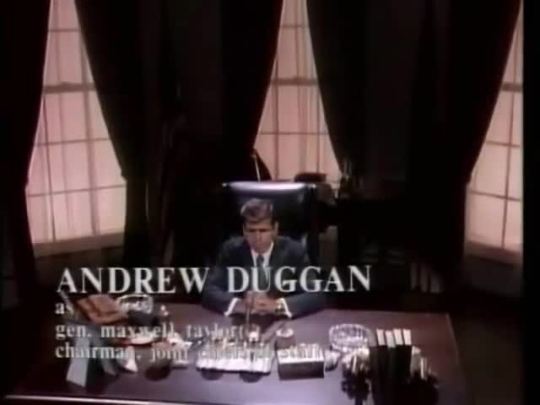
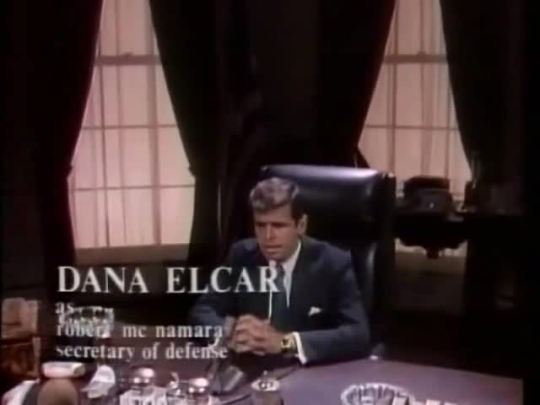
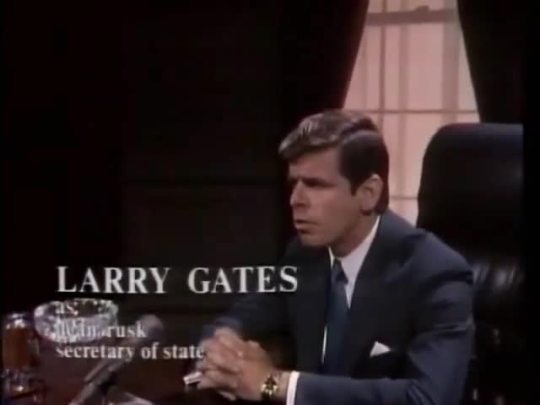

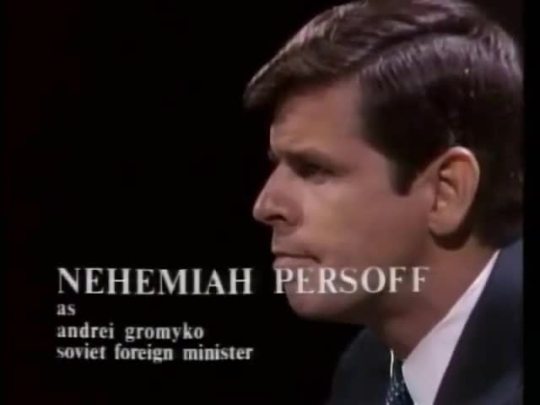
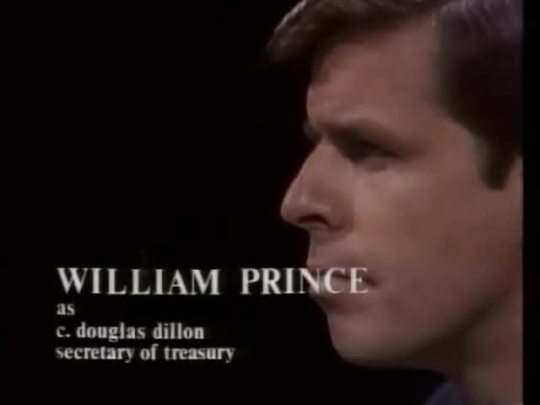

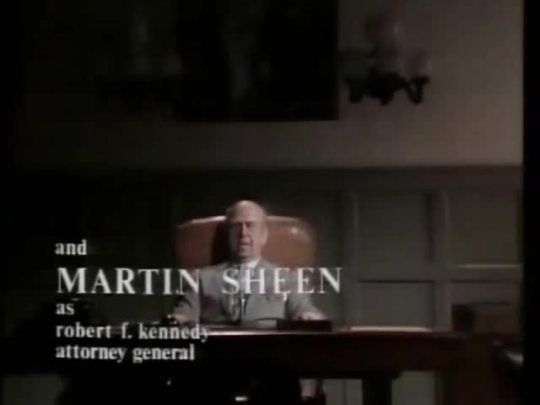
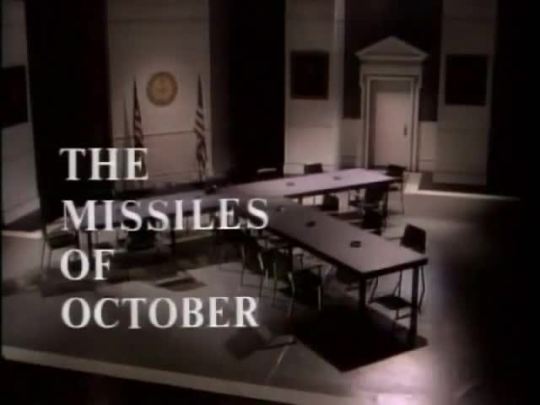
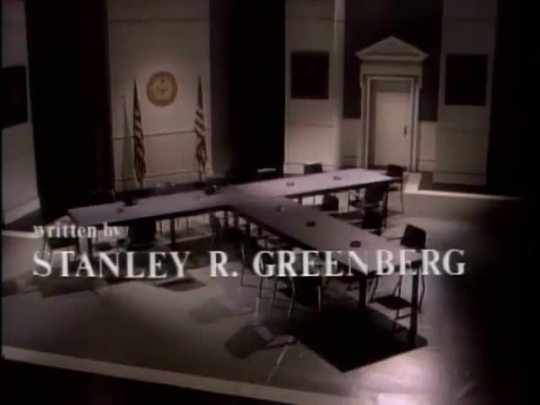
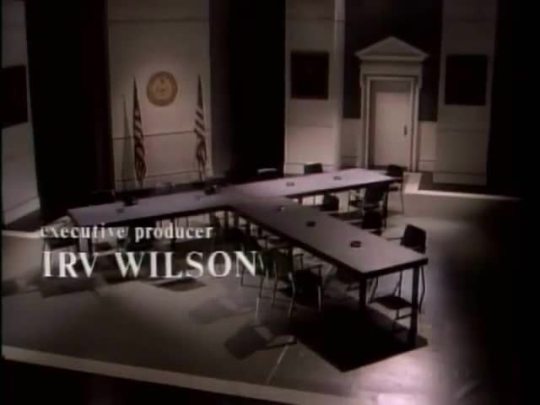
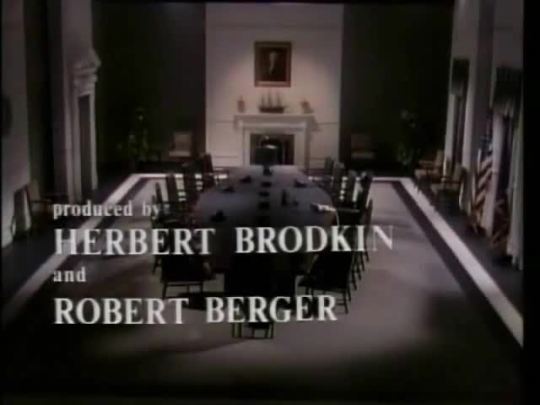

The Missiles of October - ABC - December 18, 1974
Docudrama
Running Time: 150 minutes
Stars:
Ralph Bellamy as Adlai Stevenson
Howard da Silva as Nikita Khrushchev
John Dehner as Dean Acheson
William Devane as John F. Kennedy
Andrew Duggan as General Maxwell Taylor
Dana Elcar as Robert McNamara
Larry Gates as Dean Rusk
James Olson as McGeorge Bundy
Nehemiah Persoff as Andrei Gromyko
William Prince as C. Douglas Dillon
John Randolph as George Ball
Martin Sheen as Robert F. Kennedy
Michael Lerner as Pierre Salinger
Clifford David as Theodore Sorensen
Albert Paulsen as Anatoly Dobrynin
Keene Curtis as John McCone,
Robert P. Lieb as Curtis LeMay
#The Missiles of October#TV#ABC#Docudrama#1974#Ralph Bellamy#Howard da Silva#John Dehner#William Devane#Andrew Duggan#Dana Elcar#Larry Gates#James Olson#Nehemiah APersoff#William Prince#John Randolph#Martin Sheen
6 notes
·
View notes
Note
favourite cold war fun fact? (I'm studying it for school and it's so much more boring in an exam board-approved textbook)
yeah i know what you mean.. it gets so dry in textbooks which is a shame because to me it’s very interesting!! we need more fun facts and history teachers who go on weird tangents.. ANYWAY this i learned from robert f. kennedy’s memoir called thirteen days: a memoir of the cuban missile crisis.. he says that, after the usa discovered the missiles in cuba but before they revealed them to the public, john f. kennedy had a meeting with the soviet minister of foreign afffairs, andrei gromyko. this was a meeting that had been scheduled before the whole missile situation had started, i.e. when kennedy hadn’t been aware of the missiles, but gromyko had. kennedy did not cancel the meeting because he thought it would be “awkward”.. he didn’t mention the missiles at all during the meeting despite being aware of them; meanwhile gromyko, who was also aware of them, pointedly reassured him that there were no weapons in cuba (unprovoked). kennedy clarified to him that there would be consequences for putting weapons in cuba and gromyko was like yeah don’t worry we wouldn’t do that. haha. anyway i think the mental image of this is funny like they both knew but nobody was going to say anything about it..
4 notes
·
View notes
Text
In the next few weeks or months, US president Joe Biden is expected to announce that he will run for re-election in 2024. As his masterful State of the Union speech on 7 February showed, the second year of his presidency was markedly successful. It all adds up to a serious possibility that he will go down in history as a, or even the, pre-eminent global figure of the 2020s.
So it is easy to forget that Biden is, in many respects, a product of a different US. He was first elected to the US Senate in 1972, closer in time to the end of the Second World War than to 9/11 – let alone the present day. The majority of his career played out during the Cold War and immediate post-Cold War era, the period between the end of the Vietnam War and the start of the Afghanistan War, during which Europe was the primary focus of US foreign policy most of the time.
In 1979, for example, he met with the Soviet foreign minister, Andrei Gromyko, in Moscow to discuss the Salt II arms control treaty. In the 1990s he was an early voice for intervention in Bosnia and Kosovo (which he later described as one of his “proudest moments in public life”). In 1997 Biden championed Nato expansion while co-chair of the Senate’s Nato Observer Group. As a proud Irish-American, he lobbied Bill Clinton’s administration to invest major efforts in the Northern Ireland peace process.
Biden carried the Atlanticist instincts from the pre-9/11 era into the one that succeeded it. He helped keep the western Balkans on the US agenda at a time when it was dominated by the Middle East and Afghanistan. As Barack Obama’s vice-president he often served as the European anchor of an administration otherwise determined to “pivot” to Asia. It was Biden who led on relations with Ukraine during the 2014 Maidan revolution and the initial Russian invasion that same year.
When he took office as president in 2021 he phoned Angela Merkel, Emmanuel Macron and Boris Johnson before speaking to any leaders in the Indo-Pacific, despite the latter being a stated priority of his administration. He appointed Antony Blinken, a Europe expert, as his secretary of state and Mark Gitenstein, a close confidant since the 1970s, ambassador to the EU. Biden’s first foreign trip as president took him to Europe, and Macron received the honour of being invited to make the first state visit to Washington of Biden’s presidency. The US’s dominant role in supporting Ukraine should be seen as part of that same pattern.
The Ukraine war has also supplied ample evidence of Europeans getting comfortable with this restoration of a familiar relationship, after the traumas of the Trump presidency. They looked to the Americans to lead on military aid to Kyiv and even, in the case of German chancellor Olaf Scholz, insisted that the administration send US battle tanks as a condition of Berlin providing its own Leopard 2 tanks or allowing other Europeans to do so. When the Munich Security Conference gathers between 17 and 19 February, and when Biden travels to Europe this month, we will see more of the president acting as a munificent Uncle Sam, putting a protective arm around an old continent that is broadly satisfied with that arrangement.
All too satisfied, in fact. Biden’s transatlantic instincts constitute less the restoration of old certainties than the last hurrah of a past era. The president turned 80 in November. Younger generations of US leaders see the world differently. The most obvious example is the new isolationist streak in the Republican Party: a majority of GOP voters now oppose further support for Ukraine. But even among more orthodox Republicans there is a marked “prioritiser” tendency that believes in disengaging from Europe to concentrate on Asia. As Elbridge Colby, a former senior defence official, has put it: “The United States does not have the capacity to fight both… an exceptionally stressing war with China and another significant conflict, such as in Europe against Russia.”
Even among Democrats, the post-Biden age (whether it dawns in 2025 or 2029) will mark a shift in perspectives. Centrists such as the California governor Gavin Newsom or the vice-president Kamala Harris may share Biden’s values, but they lack his formative experience of senior office during the Cold War and its aftermath, the instincts forged in that era, and his strong emotional connection to Europe.
Meanwhile, a still-younger generation of Democrats looks to standard-bearers such as Alexandria Ocasio-Cortez and Ro Khanna – progressives who put less emphasis on Nato and more on topics like climate change, trade, migration and the Global South. Influential in these circles is the Quincy Institute for Responsible Statecraft and associated intellectuals, including the historian Stephen Wertheim, author of appeals such as: “Sorry, Liberals. But You Really Shouldn’t Love Nato.”
A more far-sighted Europe – including both the EU and the UK – might have used the impetus of Russia’s war to prepare for the post-Biden world. Yet overall, Europe has implicitly interpreted the leadership provided by Biden’s administration as the new normal; proof that vigorous attempts to build European structures capable of taking over responsibility for the continent’s security from the US are now unnecessary. Talk of “European sovereignty” can often be empty, and cooperation between major powers routinely falls victim to political differences. It is a comfortable delusion to nurture: Atlanticist Bidenism forever! Comfortable, that is, until it eventually collides with reality. At that point Europe’s position could become very uncomfortable indeed.
6 notes
·
View notes
Text
From Allies to Tech Partners: The Evolution of India-Russia Relations

The relationship between India and Russia is one of those relationships which has withstood the ups and downs in the annals of the world, much like an old friendship that starts over a few disagreements but grows older into something truly matured. From military collaborations in days of yore to advanced technological partnerships today, India and Russia have grown from being wartime allies into key global players, side by side.
During World War I, India, though a British colony, found itself in the peculiar position of fighting on behalf of the British Empire, which was an ally and so part of the allies along with imperial Russia. So, yes, even in the chaos of the early 20th century, India and Russia were technically on the same side of the geopolitical divide. It's more like being at the same party because a mutual friend dragged you there, but you don't really know each other yet.
This early cooperation laid the bedrock for a deeper connection that would blossom over the following decades. During the Second World War, India fought once more on the Allied side, this time against the Axis Powers, to which the Soviet Union became similarly a key ally after being betrayed by Germany over their pact of non-aggression. So, technically, India and Soviet Russia were still friends in the global battlefield.
It wasn't until after the independence of India in 1947, however, that things really began to take off between the two countries. In the Cold War era, India and the Soviet Union became closer than ever. With the western powers, very much influenced by the U.S., cosying up to Pakistan and China, India and the Soviet Union found themselves falling into each other's arms in a sort of classic "my enemy's friend is my friend" kind of situation.

"Soviet Minister of Defense Georgy Zhukov (left) and Indian Prime Minister Jawaharlal Nehru meet for talks in New Delhi in 1956".
This evolving relationship reached a high point in the Indo-Soviet Treaty of Peace, Friendship, and Cooperation signed in 1971. It was like finally making their Relationship 'Facebook official' no more "we're just allies". The treaty solidified their military and strategic partnership, with the Soviet Union playing a key role in extending critical support to India in the Bangladesh Liberation War. It was the diplomatic equivalent of "Don't worry, we've got your back" from Russia, showing up with military support and some diplomatic flair.
It soon became one of the leading suppliers of military hardware to India, including such iconic equipment as MiG fighter jets and T-72 tanks. By this time, their friendship wasn't at all conceptual, but on one fairly solid foundation in the form of defense cooperation. In fact, the Soviet Union even supported India's first peaceful nuclear explosion back in 1974, which now, in retrospect, sounds like a rather paradoxical way to show peace, but hey, that is international relations.

"Leonid Brezhnev (right) and Indira Gandhi in Moscow during her 1976 visit to the Soviet Union."

"Soviet Minister of Foreign Affairs Andrei Gromyko and Indian Minister of Foreign Affairs Swaran Singh sign the India-Soviet Treaty of Peace, Friendship and Cooperation on Aug. 8, 1971, providing India both the diplomatic and arms support it would need for the war".
When in 1991 the Soviet Union broke up, the world was literally watching as to whether the newly formed Russian Federation and India would drift apart. Spoiler alert: they didn't. While the Cold War might be over, India and Russia found plenty of reasons to stick together great part of which had to do with military and defense cooperation. Where the Soviet Union had left the baton, Russia took over and continued to provide India with advanced military hardware, including collaboration on joint defence projects like the BrahMos missile.
But the relationship didn't just remain in the realm of tanks and jets. As the world entered the 21st century, India and Russia started working their partnership into one, well, a bit more 21st-century: technology.

"Indian Prime Minister Narendra Modi (left) and Russian President Vladimir Putin confer on a boat in the Black Sea on May 21, 2018".
Nowadays, India and Russia do not stop at being military buddies. They have entered this whole new phase of collaboration that revolves around technology and innovation. In a world where technological supremacy was the new battlefield, both countries finally seemed to come to a realization that it was not about who had the greater army, but who had better tech.
The two have been engaged in a range of cooperation, from space to nuclear energy and cybersecurity, involving the most modern technologies. This tech partnership works to strengthen their strategic positions while offering a counterbalance to rising powers like China and the influence of the West. They have become the other's gurus on technology, innovating together on what their future will be, all the while making certain they will not need the technologies of the West.
What makes the India-Russia relationship special is not the historic camaraderie between both or their particular knack for adapting to a world in constant flux geopolitically. It's also in the fact that this partnership thrives on mutual respect, and shared strategic interests, let's get candid few warm and memorable hugs. Well, we cannot get into an Indian-Russian relationship without mentioning how Indian Prime Minister Narendra Modi appears to be the only world leader who is brave enough to, rather, boldly wrap his arms around famously circumspect Vladimir Putin. In fact, it requires a feat of courage, commitment, and probably a deep understanding of Russia's cold winters.
From the bear hug, Mr Modi gave Putin to years of defence collaborations, this has been a relationship that has transcended the realms of mere handshakes and agreements. Perhaps, symbolically speaking, the hug is symbolic of their long-lasting, resilient, and comfortable even in the coldest of geopolitical climes.

Both countries are deepening relations in defence and technology, proving a partnership can last through any historical storm. Indeed, with every new joint venture, they position themselves to play key roles in shaping the global balance of power in the future.
It moved from colonial allies to Cold War strategic partners and now tech collaborators. All in all, it is a story of resilience, adaptability, and above all, mutual respect. As both countries forge ahead, their partnership will keep playing a critical role in shaping not only their respective futures but the wider dynamics of global geopolitics and technology.
1 note
·
View note
Text
Andrei A. Gromyko: Flinty Face of Postwar Soviet Diplomacy
By Craig R. Whitney
July 4, 1989
Credit...The New York Times Archives
See the article in its original context from
July 4, 1989, Section 1, Page 8
VIEW ON TIMESMACHINE
Whether Andrei Andreyevich Gromyko was a principal architect of the policies he expounded over nearly three decades as Soviet Foreign Minister, or simply their loyal executor, remains a mystery shrouded in his loyalty to the cause he served so long.
What is clear is that Stalin, Nikita S. Khrushchev and Leonid I. Brezhnev all found him indispensable in turn. But Mikhail S. Gorbachev finally found him an obstacle to his program for sweeping change in Soviet internal and external affairs and ended Mr. Gromyko's 28-year tenure as Foreign Minister in July 1985 by easing him upstairs to the ceremonial post of the presidency.
Mr. Gromyko had been the instrument of Mr. Gorbachev's accession to the leadership of the Soviet Communist Party in March 1985, going before his aging colleagues in the Politburo then to tell them that it was time to cede the leadership to a younger man.
Later, after Mr. Gromyko retired, he wrote his memoirs - revising them in 1989 as ''Memories,'' published in Britain by Hutchinson - and said he had decided himself to retire as President in October 1988 because he felt old and out of touch. In April 1989, he was dropped from his last position of power as a member of the Politburo, in a sweeping purge of the old guard by Mr. Gorbachev.
By that time, Soviet policies associated with the cautious Mr. Gromyko were being swept aside with dizzying speed. In what Mr. Gorbachev called ''new thinking,'' one arms reduction proposal followed another, and the Soviet grip over Eastern Europe relaxed, allowing Hungary and Poland to evolve in political directions Mr. Gromyko described as counter-revolutionary when they first surfaced decades earlier. The Soviet military intervention in Afghanistan that he and his colleagues had decided on in 1979 was openly derided 10 years later as a costly mistake. To Foreign Ministry at 29
Thus ended an extraordinary diplomatic and political career that had begun in 1939 when Foreign Minister Vyacheslav M. Molotov called Mr. Gromyko, a postgraduate student not yet 30 years old, to the Foreign Ministry.
In the years that followed, he traveled to most of the countries of the globe, met and outlived the greatest statesmen of the age.
Present at the creation of the United Nations, he never missed a General Assembly session until he left the Foreign Ministry. He was the first professional diplomat to be elevated to the Soviet Communist Party's ruling Politburo, and he was one of the few members who did not drink, even before Mr. Gorbachev took over and decreed abstemiousness as one of his first reforms.
He was the able spokesman for many different Soviet policies over the years. He was ''Mr. Nyet'' in the cold war, the ''new Gromyko'' during the period of detente, and the dour and gruff exponent of a tougher line in Afghanistan and Poland in later years.
While Mr. Gromyko was new to office, Khrushchev, who had appointed him, told a group of foreign ambassadors, ''If I tell my Foreign Minister to sit on a block of ice and stay there for months, he will do it without back talk.''
As he acquired experience, Soviet officials acquired more respect for him, and gradually the Foreign Ministry became his personal preserve. Foreign diplomats agreed that he always seemed to be in charge and superbly in command of his material.
Mr. Gromyko's career was closely bound up with the United States. In the spring of 1939, when he was a researcher at the Academy of Sciences' Institute of Economics in Moscow and learning English, Molotov had him transferred to the Foreign Ministry, most of whose experienced men had been eliminated in Stalin's purges.
He was put in charge of the American section, and six months later found himself in Stalin's office, where the dictator announced that he was sending him to the embassy in Washington as second in command. In 1943, Stalin appointed him Ambassador to the United States. After the war, he moved to New York for the first sessions of the United Nations, living at first in a Plaza Hotel suite.
There - in the belly of the capitalist beast, as he later put it in ''Memories,'' translated by Harold Shukman - he confirmed a view of America that stayed with him all his life: ''Profit is the pitiless filter through which everything to do with culture and art and the country's spiritual life has to pass. Only that which promises a return on capital can survive.'' Early Life and Family
The future Foreign Minister was named Andrei Burmakov when he was born on July 18, 1909, in the village of Stariye Gromyki, in what is now Soviet Byelorussia. The local baptismal and official records, for Andrei and nearly everybody else in the village, listed the family name as ''Gromyko.'' His father, Andrei Matveyevich, was a literate peasant who had served in the Czar's army in the Russian-Japanese war and worked at odd jobs around the village.
After the war and the revolution, Andrei finished primary and trade schools. Later he attended a technical school near Minsk, where he joined the Communist Party in 1931, and, that same year, he met and married Lidiya D. Grinevich, a fellow student he described as the daughter of Byelorussian peasants. The couple preserved an affectionate relationship through their long marriage, occasionally holding hands at diplomatic receptions.
The Gromykos had two children and five grandchildren. A daughter, Emiliya, studied history and later married a Soviet diplomat, Aleksandr S. Piradov, an ambassador at large. A son, Anatoly, born in 1932, also entered the diplomatic service, served at one point in the embassy in Washington and has been director of the Africa Institute of the Academy of Sciences in Moscow since 1976.
The young Mr. Gromyko also studied economics and Marxist theory at an institute in Minsk, then went to Moscow for the economics research that he left for diplomatic work. Taking Care of Details
During World War II, Stalin and President Roosevelt carried on Soviet-American relations largely by themselves, and Mr. Gromyko's job then, as throughout his life, was to take care of the details. Yet he evidently had a certain amount of Stalin's trust.
In the summer and fall of 1944, Mr. Gromyko helped conceive the United Nations in talks held by the United States, Britain and the Soviet Union at Dumbarton Oaks in Washington. He urged successfully that each of the major nations should have veto power, and after he became the first permanent Soviet representative to the United Nations in 1946, he used it - 25 times before he left the post in Juy 1948.
But he also voted with the majority on occasion. In 1947, for instance, he supported the resolution for partition of Palestine into Jewish and Arab states.
He had become a Deputy Foreign Minister when he was moved to the United Nations, and in 1949 he became a First Deputy Foreign Minister in Moscow under Molotov's successor, Andrei Y. Vishinsky.
He often acted as Foreign Minister during Mr. Vishinsky's illnesses and vacations. This period came just after the Soviet blockade of Berlin in the winter of 1948-49, and during the formation of the military alliances of the North Atlantic Treaty Organization and the Warsaw Pact, and later the Korean War.
In 1952 Mr. Gromyko was sent to London as Ambassador to the Court of St. James's, and he was there when Stalin died in March 1953. Named by Khrushchev
In the jockeying for power that followed, Molotov again became Foreign Minister, and brought Mr. Gromyko back to Moscow as his First Deputy. As Khrushchev consolidated his power over the next few years, Molotov fell out of favor, and in February 1957, Mr. Gromyko became Foreign Minister.
As long as Khrushchev held power, Mr. Gromyko was treated like a lackey, but he bore the indignities loyally.
In his memoirs, Khrushchev described him as ''a good civil servant who always went by the book.'' He made light of Mr. Gromyko's professional thoroughness.
A Western diplomat who met Mr. Gromyko at disarmament talks in Geneva in 1959 remembered him with awe. ''He had the American, British and French Foreign Ministers - Christian A. Herter, Selwyn Lloyd and Couve de Murville - standing on their heads,'' the diplomat recalled. ''And Gromyko was speaking in English at that. It was a real performance.''
Few of the great East-West foreign policy issues of the next few years bore Mr. Gromyko's mark. Khrushchev was too colorful a personality. When the Soviet leader took off his shoe and banged it on his desk at the United Nations in 1960, Mr. Gromyko did not follow suit. The bottom left corner of his mouth turned down even further than usual, and he simply scowled. The Cuban Missile Crisis
In American eyes, Mr. Gromyko's status sank even further during the Presidency of John F. Kennedy. In the Cuban missile crisis of October 1962, he appeared to American officials to be either ignorant of the facts or lying about them.
At the height of the confrontation, after the United States had gathered photographic evidence of Soviet construction of missile bases in Cuba, Mr. Gromyko met with President Kennedy, on Oct. 17, but acted as though he knew of no missile emplacements.
Robert F. Kennedy later recounted the scene in his memoir, ''Thirteen Days:''
''President Kennedy listened, astonished, but also with some admiration for the boldness of Gromyko's position. To avoid any misunderstanding, he read aloud his statement of Sept. 4, which pointed out the serious consequences that would arise if the Soviet Union placed missiles or offensive weapons within Cuba.
''Gromyko assured him this would never be done, that the United States should not be concerned. After touching briefly on some other matters, he said goodbye.''
Shortly after that, President Kennedy ordered a naval blockade to stop Soviet shipments of strategic missiles to Cuba, and the Russians backed down. Some think Mr. Gromyko never knew about the bases.
In his own memoirs, he insisted: ''Contrary to later assertions made in the West, at no time in our conversation did Kennedy raise the question of the presence of Soviet rockets in Cuba; consequently there was no need for me to say whether there were any there or not.''
The debacle of this ''Caribbean crisis,'' as the Russians call it, was one of the reasons for Khrushchev's ouster two years later. Only after Khrushchev's removal did Mr. Gromyko really begin to come into his own. A 'New Gromyko'
The new collective leadership, with Brezhnev and Aleksei N. Kosygin soon emerging at the top, left Mr. Gromyko in his key position at the Foreign Ministry.
But the years after 1964 saw the emergence of the ''new Gromyko'' and of a foreign policy of a different order from the bluster, blunder and boast of the Khrushchev years. Diplomats noticed that the usually dour Foreign Minister smiled more often and even made a discreet joke. He seemed to become more his own man.
In these years, the alliance with China dissolved in ideological and territorial rivalry. Soviet control over Eastern Europe threatened to break up with the short-lived 1968 liberalization in Czechoslovakia but was reaffirmed with the Soviet-led invasion.
''The Soviet people are under no obligation to ask for permission to intervene when issues of world peace and the freedom and independence of peoples are involved,'' Mr. Gromyko said later. ''That is our right as a world power.''
For all the assertiveness of that statement, the focus of Soviet foreign policy in the Brezhnev-Kosygin-Gromyko era was not confrontation but detente with the West, necessitated by the growing rift with China. A Rise to Stature
Mr. Gromyko was entrusted with the details, the negotiations, the treaty texts and the technical agreements that gave detente shape and life. Loyally as always, he did the party's bidding in this as in so much else, but he was also acquiring stature and authority.
It was he who negotiated the Soviet-West German treaty of 1970 in which Bonn recognized the postwar division of Europe, the existence of East Germany and the loss of the former German territories. Then, in a 1971 treaty with the United States, Britain and France, the Soviet Union agreed to normalize the status of West Berlin.
Talks on limiting both sides' long-range bombers and missiles carrying nuclear weapons became the linchpin of the improving Soviet-American relationship in the early 1970's and, at least for a while, were the basis for continued good relations even after detente came under strain. Mr. Gromyko became as closely identified with the process as Brezhnev. Most Western diplomats in Moscow came to believe that by the end of the decade Mr. Gromyko was as much involved in formulating Soviet foreign policy as he was in expounding it.
The first strategic arms agreement was reached after President Nixon went to Moscow in May 1972 for talks with Brezhnev. The negotiations produced a treaty limiting defensive antiballistic missile systems on both sides, and another, expiring in 1977, limiting offensive weapons. Elevation to Politburo
Soon after that, Brezhnev and his colleagues decided that it was time to bring Mr. Gromyko into the central decision-making group, and he was elevated to full membership in the Politburo on April 27, 1973.
With this greater status, Mr. Gromyko went to Helsinki, Finland, in July 1973 to promote another Soviet diplomatic initiative - a conference on European security and cooperation to achieve the long-sought Soviet goal of Western recognition of the postwar division of Europe.
The Foreign Minister's authority held, and as time went on and Brezhnev's health began to fail, the Soviet leader increasingly left his foreign policy to Mr. Gromyko.
The two traveled to Vladivostok in 1974 to meet with President Ford on guidelines for a second treaty to limit strategic arms. The real bargaining began after the Carter Administration took office in January 1977, with Mr. Gromyko by then the key figure on the Soviet side.
Secretary of State Cyrus R. Vance startled the Russians in March 1977 with new proposals to go beyond the Vladivostok agreement. But Mr. Gromyko called a televised news conference March 31 and rejected the proposals. His remarks were polished, touched with anger and sarcasm, as he accused the United States of seeking unilateral advantage. But he also said Moscow had ''enough patience to continue negotiations on all these problems.''
For more than two years, he and Mr. Vance met in Moscow, Washington and Geneva to work out the details of a new treaty, which was signed by Mr. Carter and Brezhnev in Vienna in June 1979. But the accord was never ratified. A New Freeze With U.S. The move into Afghanistan sent American-Soviet relations into a deep freeze at the beginning of 1980, and thus began the third phase of Mr. Gromyko's diplomatic career.
About this time the leaders of the Soviet Union began to be crippled by age and poor health. First Brezhnev, in 1982, and then his two immediate successors, Yuri V. Andropov and Konstantin U. Chernenko, died in office. Until 1985, when Mr. Gorbachev came to power, the United States and the rest of the outside world had to go through Mr. Gromyko to deal with the Kremlin.
And as personified by Mr. Gromyko, the Soviet leadership in those years was increasingly intractable and irascible, insisting on a martial law crackdown against the Solidarity movement in Poland, rejecting calls from a United Nations majority to pull out of Afghanistan, and rebuffing President Reagan's proposals to eliminate Soviet and American medium-range missiles from Europe.
After the NATO alliance decided in 1983 to deploy American medium-range missiles in Europe to match Soviet SS-20's, the Russians walked out of negotiations, ushering in a period some feared would be a new cold war.
When Moscow was ready to break the ice, Mr. Gromyko was the emissary, coming to the United Nations in the fall of 1984 to meet with Mr. Reagan. Early in 1985, he met in Geneva with Secretary of State George P. Shultz to start a new framework for dealing with space-based systems and nuclear arms. Ushering in Gorbachev
But Mr. Gromyko was to call the shots in those negotiations for only a few more months. In March 1985, after Mr. Chernenko's death, he took the floor in a closed session of the Central Committee to nominate Mr. Gorbachev as the new Soviet leader.
''This is a man of principle, a man of strong convictions,'' he said. ''I can personally confirm this.''
Revealing how the younger man had run leadership meetings during Mr. Chernenko's illness, Mr. Gromyko said of his abilities in foreign affairs: ''Mikhail Sergeyevich has spoken out on many occasions, including Politburo meetings, on how essential it is for us, as they say, to keep our powder dry.''
He is reported to have said of Mr. Gorbachev, ''Comrades, this man has a nice smile, but he has iron teeth.''
ADVERTISEMENT
SKIP ADVERTISEMENT
That July, Mr. Gromyko became the Soviet President. Mr. Gorbachev replaced him in the foreign affairs post with a man with little diplomatic experience, Eduard A. Shevardnadze. The move was a master stroke, at once honoring Mr. Gromyko for his decades of service and ending any threat he might pose to Mr. Gorbachev.
From then on, Soviet policymaking in foreign affairs were clearly the province of Mr. Gorbachev and the advisers of his choice -Mr. Shevardnadze and Anatoly F. Dobrynin, the former Ambassador to the United States. When Mr. Reagan and Mr. Gorbachev met for their first summit meeting in Geneva in November 1985, Andrei Gromyko was the man who wasn't there.
Andrei A. Gromyko: Flinty Face of Postwar Soviet Diplomacy - The New York Times (nytimes.com)
0 notes
Text
Stalin announces new mobalisation
Promote Andrei Gromyko to Minister of Foreign Affairs and give 50,000 infantrymen to ensure his safety. Promote Semyon Denisovich Denisov to Marshal of The Air Force. Send an additional 5,000 engineers to Semyon Denisovich Denisov to continue to develop the Soviet’s aircrafts, airplane and technologies. Mobilize an additional 3 armored divisions and 5 artillery divisions to the North Korean border, Vladivostok. Regroup with the cavalry and the 200,000 infantrymen. Continue with drills, stockpile food and prepare for war.
0 notes
Note
Was Henry A. Wallace a spy or just a Soviet tool?
I think Wallace was just deeply idealistic and probably a true Socialist at a time when Americans could not differentiate between Socialism and "evil" Soviet Communism (well...Americans still can't do that), and that his idealism allowed the Soviets to use him to their advantage. But I definitely don't believe he was a spy or even a conscious Soviet asset.
Calder Walton wrote a book last year called Spies: The Epic Intelligence War Between East and West (BOOK | KINDLE | AUDIO) that was published my Simon & Schuster and I actually posted this excerpt a few months ago about Wallace and the Soviets during the Cold War that might answer your question a bit better:
Russian archival records obtained for this book show that [Joseph] Stalin colluded with his favorited U.S. candidate in 1948, Henry Wallace, [Franklin D.] Roosevelt’s Soviet-friendly wartime Vice President.
The nature of Wallace’s relationship with the Kremlin has long been a subject of speculation. Soviet intelligence is known to have unimaginatively code-named the Vice President CAPTAIN’S DEPUTY during the war. But no evidence has ever emerged that Wallace was recruited as a Soviet agent. He was, however, we can now discern, a Soviet tool. He sincerely believed that “peaceful coexistence” between the Soviet Union and the United States not only could be achieved, but was essential for world peace. All the while, he looked away from (and naively followed Soviet propaganda denying) the existence of Stalin’s mass forced labor and terror programs. According to [President Harry S.] Truman’s counsel Clark Clifford: “It was never clear to me how aware he [Wallace] was of the uses to which the Communist Party was putting him, but whether he knew it or not, he was following the communist line, serving communist ends, and betraying those Americans who supported him as a serious alternative to the two main candidates [in 1948].” Wallace’s naivete about Soviet communism turned him into an asset for Stalin, if not a recruited Soviet agent.
Wallace decided to run in the 1948 U.S. election as the Progressive Party nominee. In April and May that year, he secretly liaised with Stalin about public policies that would be advantageous for the Soviet Union, coordinating his public statements with the dictator. Wallace secretly met with the youthful Soviet ambassador to the UN in New York, Andrei Gromyko, who dispatched the candidate’s messages to the Soviet foreign minister, [Vyacheslav] Molotov, and to Stalin himself. In his memoirs, Gromyko admitted to meeting Wallace, but downplayed the meeting’s significance, suggesting that after talking with him he considered that Wallace had lost contact with the pulse of American life. Archival documents in Moscow reveal that in fact Stalin took Wallace’s position and candidacy seriously, approving his public positions, and answering questions that the former Vice President put to him, which Stalin annotated in his distinctive pencil. Their alignment produced a published open letter from Wallace to Stalin, vetted by the Soviet leader in advance, to which Stalin then publicly replied, all as agreed between the two men.
Wallace’s Presidential election bid in November 1948 dismally failed; he ended up getting barely 2 percent of the vote, while Truman, to his and the nation’s surprise, won a second term. He defeated New York Governor Thomas E. Dewey in one of the greatest upsets in U.S. Presidential history. Ironically, the staff of Wallace’s failed 1948 campaign included none other than the Soviet atom spy Ted Hall. Following his unsuccessful White House run, Wallace had a crisis of faith in his pro-Stalinism. This may have been caused by his realization that Stalin had used and discarded him after the election. Stalin had gotten what he wanted from Wallace. In 1952, Wallace published an article, “Where I Was Wrong,” describing “Russian Communism” as “utterly evil.” The Kremlin and its intelligence services nevertheless learned an important strategic lesson for later in the Cold War: that it could use the freedoms inherent within American electoral campaigns to influence candidates favorable to the Soviet Union.
#History#Henry A. Wallace#Vice Presidents#Vice President Wallace#Henry Wallace#Soviet Union#Soviets#Cold War#Communism#Socialism#1948 Election#Joseph Stalin#Stalin#Spies#Spies: The Epic Intelligence War Between East and West#Calder Walton#VPs#Cold War History#Espionage
8 notes
·
View notes
Text
Press Release - Andrei Gromyko
6 September 1957
Comrades, comrades: The issue of the council directive is now of most importance. This comrade urges any comrades who have qualms with the economic status of the "Necessary Acts of the Union" to quickly resolve them with the sponsors, keeping in mind that funds can freed from nuclear research as we have developed the "Bomba" and are in talks with the USA for partial test bans. We should call an unmoderated caucus and resolve this issue within this council, immediately. Long live the Soviet Union
0 notes